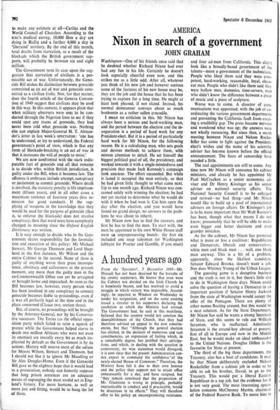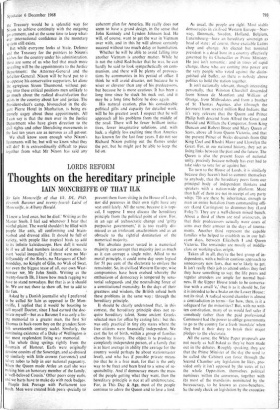Nixon in search of a government
AMERICA JOHN GRAHAM
Washington—One of his friends once said that he doubted whether Richard Nixon had ever had any fun in his life. Certainly he doesn't look especially cheerful even now, and this strikes me as a little odd. After all, whatever you think of his new job and however curious some of the features of his new house may be, they are the job and the house that he has been trying to capture for a long time. He might at least look pleased, if not elated. Instead, his normal demeanour conveys about as much bonhomie as a rather sullen crocodile.
I mean no criticism in this. Mr Nixon has always been a serious and hard-working man, and the period between the election and the in- auguration is a period of hard work for any President-elect. But it is a period of particularly hard work for Mr Nixon, for the following reason. He is a calculating man, who sets goals and devises methods to achieve them, with minute attention to detail. He set himself the biggest political goal of all, the presidency, and worked towards it with a single-mindedness and precision that made Jack Kennedy's campaign look amateur. The effort succeeded. But while it lasted it occupied the man entirely, so that he had given little thought to what came next. Up to one month ago, Richard Nixon was con- cerned solely with winning the election; he had not yet started to determine what he would do with it when he had won it. Cut him open the day after the election, and you would have found no grand design, no answers to the prob- lems he was about to inherit.
Mr Nixon now has to find the answers, and first he has to find the men. To start with, the men he appointed to his own White House staff were an unprepossessing bunch : the first six included one soap salesman (or Washington lobbyist for Procter and Gamble, if you must) and four ad-men from California. This didn't look like a broadly-based government of the talents—more a government of the technicians. People who liked them said they were com- petent, hard-working, reasonable, loyal, clean- cut men. People who didn't like them said they were hollow men, dummies, time-servers, men who didn't know the difference between a piece of music and a piece of sculpture.
Worse was to come. A director of com- munications was appointed, with the job of co- ordinating the various government departments and preventing the California fault from creat- ing a credibility gap. The press became nervous and wondered what was up; the answers were not wholly reassuring. But since then, a secret meeting between Nixon and Nelson Rocke- feller has come to light against the President- elect's wishes and the name of his scientific adviser has become known before the official announcement. The fears of censorship have receded a little.
The real appointments are still to come. Any time now Mr Nixon will announce his cabinet ministers, and already he has appointed Mr Paul McCracken as a senior economics ad- viser and Dr Henry Kissinger as his senior adviser on national security affairs. The National Security Council is to be enlarged 'and revived—no bad thing—and Mr Nixon would like to build up a pool of international advisers on foreign affairs. Dr Kissinger's job is to be more important than Mr Walt Rostow's has been, though what that means I do not know; presumably that he will be able to make even bigger and better decisions and even grander mistakes.
As for the cabinet, Mr Nixon has promised what is more or less a coalition: Republicans and Democrats, liberals and conservatives, white men and black men- . . . well, one black man anyway. This is a bit of a problem, apparently, since the likeliest candidate, Senator Edward Brooke, doesn't want a job. Nor does Whitney Young of the Urban League.
The guessing game is a deceptive business and the truth is not in it, but there's little else to do in Washington these days. Nixon could solve the question of having a Democrat in an important position if Senator Henry Jackson from the state of Washington would accept the offer of the Pentagon. There are plenty of other names floating around, but this would be a neat solution. As for the State Department, Mr Nixon has said he wants a strong Secretary of State, and this seems to rule out William Scranton, who is ineffectual. Admittedly Scranton is the errand-boy abroad at present, first of all in Europe and now in the Middle East, but he would make an ideal ambassador to the United Nations. Douglas Dillon is the fayourite for State at present. The third of the big three departments, the Treasury, also has a host of candidates. It may be that Nixon deliberately excluded Nelson Rockefeller from a cabinet job in order to be able to ask his brother, David, to go to the Treasury. This would put a liberal Eastern Republican in a top job, but the evidence for it is not very good. The most interesting specu- lation concerns McChesney Martin, chairman of the Federal Reserve Bank. To move him to the Treasury would be a splendid way for Nixon to achieve continuity with the outgoing eosernment, and at the same time to keep what- e‘er international confidence in the monetary s%stem still exists. But while everyone looks at State, Defence 5nd the Treasury for the pointers to Nixon's ishes for the country under his administration. there are some of us who feel that much more revealing will be the appointments to the Justice Department: the Attorney-General and the Solicitor-General. Nixon will be hard put to it to appease his conservative supporters, let alone the egregious Strom Thurmond, without put- ting into these critical positions men unlikely to do much about the radical dissatisfaction that exists in the country about law and justice. The President-elect's camp, bivouacked in the ele- gant Pierre Hotel in Manhattan, is being ex- tremely cagey about these appointments. All I can say is that the men over in the Justice Department who have given direction to the civil rights and other liberalising movements in the last ten years are as nervous as all get-out. We shall know soon enough who Nixon's lieutenants will be, but will we know what they ill do? It is extraordinarily difficult to piece together from what Mr Nixon has said any
coherent plan for America. He really does not seem to have a grand design, in the sense that John Kennedy and Lyndon Johnson had. He will, of course, want to get the war in Vietnam over with, and in this he will almost certainly succeed without too much delay or humiliation.
Whether he will be able to avoid falling into another Vietnam is another matter. While he is not the rabid Red-baiter that he was, he can hardly be said to look sympathetically on com- munism, and there will be plenty of provoca- tions by communists in his period of office. I think he will avoid disaster, not because he is wiser or cleverer than any of his predecessors, but because he is more cautious. It has been a long time since he stuck his neck out, and it may be a long time before he does again.
His natural caution, plus his considerable political gifts and capacity for detailed work, will be his greatest asset. I suspect that he will approach all his problems from the middle of the road. There will be fewer brilliant initia- tives, fewer imaginative solutions, and, with luck, a slightly less exciting time than America has known for the last four years. I do not see Richard Nixon putting out the flames under the pot, but he might just be able to keep the lid on.



































 Previous page
Previous page